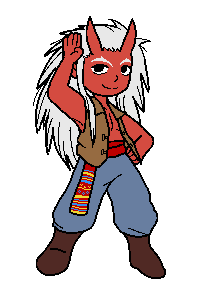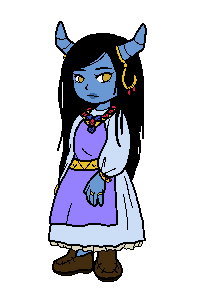| OZRUT |
  |
| BESTRIDING HILL AND FOREST |
| Ozrut are larger than life. Prominent horns, sometimes irregular in shape and number, protrude from the unruly white or black hair on their heads, and bright red or blue skin completes the striking appearance. Their powerful frames lend themselves to warlike professions, but no small number are prodigious spellcasters. Demeanors are writ large upon them: strong chins tilt up proudly, cunning eyes search and sparkle, stubborn brows overhang and glower. |
| EARTHSHAKING EMOTION |
| In a very real sense the ozrut are their emotions. Powerful impulses barely contained even within their prodigious size course through them: towering rage, darkest despondency, fathomless despair, boisterous mirth. An ozrut hiding their feelings tends to still give off the impression that they’re battling to hold something back. Their hearts are full of passions both productive and self-destructive, and they wear their hearts on their sleeves. When unleashed, they can quickly spin out of control in a cathartic whirlwind, and this is one of the reasons ozrut are rarely found in large groups. |
| SOLITARY AT HEART |
| Among their own kind, ozrut live in small groups
specific to their subrace, usually centered on a single family. In
the most isolated areas, they lead pastoral lives according to the
environment: hunting, farming, feuding or cooperating with other
nearby ozrut communities. Where the rest of the world encroaches,
the situation becomes more complex. Historically, they were much
feared for preying on travelers who intruded too closely. “Ozrut”
was once synonymous with “mountain bandits” or “forest-dwelling
highwaymen”. As roads become more traveled, cities larger, lords
and nations more powerful, however, even the ozrut must bend.
Clans and villages have found success in trade with outsiders,
offering high-quality goods made with ancient techniques. |
| ALIENATION |
| Ozrut communities are small for a reason. The
competing personalities and heady passions bursting from each
member are difficult to keep in check forever. It’s not uncommon
for family members to finally come to blows over some
disagreement, with an aggrieved party leaving or being cast out.
Among those of less belligerent bent, they might simply slip away
either unannounced or on some excuse, unwilling to put up with
their kin any longer. |
| OZRUT NAMES |
| Family is a potent force in ozrut naming
conventions, as it is one of the largest social structures they
observe. Female surnames always end in “a,” differentiating
them from their male kin. Example Male Names: Izydor, Fryderyk, Bogumir, Kajetan, Olgierd, Kazmir, Misost, Beterez Example Female Names: Wiera, Henryka, Elzbieta, Teodora, Zaklina, Agata, Daniyzeta, Lixwa |
| OZRUT TRAITS |
| Ability score increase. Your
Constitution score increases by 2. Age. Ozrut reach maturity at age 20 and have been known to reach almost 300 years old. Alignment. Ozrut are independent and wild, and their social structures rarely exceed the size and reach of an extended family, let alone a village. They are generally chaotic in outlook. Size. Ozrut range between 6 and 7 and a half feet in height and can weigh up to 450 pounds. Your size is Medium. Languages. You can speak, read, and write Common and Ozrut. Ozrut is a rough, complex language with little relation to the iaret alphabet now used to write it. Proverbial Armament. You have proficiency with the maul. Blessing of Father Cloud. You know the cantrip Produce Flame. Blessing of Mother Mountain. You have resistance to cold damage. Subraces. Two subraces of Ozrut exist: Rumiany and Markotny. Rumiany Ozrut Red-skinned, tangle-haired, and grimacing, that is the rumiany ozrut of storybooks. Your people live in isolated homesteads in the mist-bound mountain heights, away from annoyances down below. Your heritage is that of ferocious fighters who made the mountains risky for travelers for generations. Ability score increase. Your Strength score increases by 1. Savage Attacks. When you score a critical hit with a melee weapon attack you can roll one of the Weapon’s damage dice one additional time and add it to the extra damage of the critical hit. Wild-Eyed and Grimacing. You have proficiency in Intimidation. Markotny Ozrut Blue-skinned, with sullen eyes and a dour expression, that is the markotny ozrut of storybooks. Your people live under the eaves of darkly forested foothills and begrudgingly trade with the outside world and your rumiany cousins. Your heritage is of brooding endurance and cunning forgecraft. Ability score increase. Your Intelligence score increases by 1. Relentless Endurance. When you are reduced to 0 hit points but not killed outright, you can drop to 1 hit point instead. You can’t use this feature again until you finish a long rest. Mountain Ironmongery. You have proficiency with smith’s tools. |
| OZRUT ADDENDA |
| Old as the Hills Ozrut continue to grow as they age, with their features becoming exaggerated according to their disposition. A tempestuous chieftain’s eyes will bulge wildly, and his jaw jut with pugnacious tusks. A bitter crone might stoop to become twisted and gnarled as an old branch. Elder ozrut, as they are known, usually remove themselves from others, going off to live out their last years in the highest peaks or the most tangled forest depths. Fading Strength The age of legends when the world was wild and mysterious has long ended, and with it the day of the ozrut. In this new civilization that the iaret have bequeathed the ozrut are an ill fit. Clans dwindle, and ozrut living among other races rarely start families. Only in myth does the blood of the rumiany and markotny mingle. Graven Images The ozrut language was originally written in runes that are both alphabetic and pictographic. There are a few well-known examples of epic poetry written in the language, but limited modern literature. Firewater Rumiany favor mead as their spirit of choice, fermented from wild honey. The agriculturally-focused markotny brew gorzalka from potatoes. The fierce rumiany enjoying smooth and sweet mead and their dour cousins indulging in the more fiery tipple is one of life’s contradictions. This Story Is True Even with a written language, the ozrut have a very strong oral tradition which they claim goes back to a time when the gods walked the earth. Tales are meant to be taken seriously, beginning and/or ending with the formal phrase “this story is true” and including bona fides about who told it and who can vouch for its veracity. Some tales are meant to be told by a pair of tellers, with each bolstering the other’s claims. In this way, myths and legends live on among the ozrut, just out of sight, or on the other side of the mountain. Just ask anyone and they’ll tell you. Your Tale Personal accomplishment is at a premium among the ozrut, owing to their fractured and semi-solitary society. Visitors to a village or clan are expected to let their hosts know why anyone should care who they are, and listen politely to the deeds of prominent locals in turn. Flagrant embellishment is common, even expected. Drink deep of the bowl offered in friendship, it will loosen the tongue. Why be ordinary when surrounded by men and women of such stature? After all, this story is true. A Great Rack Folk wisdom on the (sometimes contradictory) meaning of different horn types pervades ozrut traditions. Shorter, stubbier horns are regarded as granting a predisposition toward magical talent. Ozrut with more than two horns are considered to be “wilder” than others of their kind: more ferocious rumiany and more withdrawn markotny. Other traditions are more mundane, such as the belief that broad horns mean an ozrut will marry young, or that orzut whose tusks develop early are old souls. |